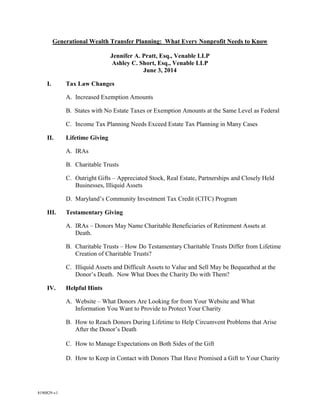Generational Wealth Transfer Planning: What Every Nonprofit Needs to Know - Handout
- 1. Generational Wealth Transfer Planning: What Every Nonprofit Needs to Know Jennifer Pratt, ESQ, Partner, Venable, LLP 2014 Nonprofit Empowerment Summit Giving It Our All! Ashley Short, ESQ, Associate, Venable LLP
- 2. 8190829-v1 Generational Wealth Transfer Planning: What Every Nonprofit Needs to Know Jennifer A. Pratt, Esq., Venable LLP Ashley C. Short, Esq., Venable LLP June 3, 2014 I. Tax Law Changes A. Increased Exemption Amounts B. States with No Estate Taxes or Exemption Amounts at the Same Level as Federal C. Income Tax Planning Needs Exceed Estate Tax Planning in Many Cases II. Lifetime Giving A. IRAs B. Charitable Trusts C. Outright Gifts ŌĆō Appreciated Stock, Real Estate, Partnerships and Closely Held Businesses, Illiquid Assets D. MarylandŌĆÖs Community Investment Tax Credit (CITC) Program III. Testamentary Giving A. IRAs ŌĆō Donors May Name Charitable Beneficiaries of Retirement Assets at Death. B. Charitable Trusts ŌĆō How Do Testamentary Charitable Trusts Differ from Lifetime Creation of Charitable Trusts? C. Illiquid Assets and Difficult Assets to Value and Sell May be Bequeathed at the DonorŌĆÖs Death. Now What Does the Charity Do with Them? IV. Helpful Hints A. Website ŌĆō What Donors Are Looking for from Your Website and What Information You Want to Provide to Protect Your Charity B. How to Reach Donors During Lifetime to Help Circumvent Problems that Arise After the DonorŌĆÖs Death C. How to Manage Expectations on Both Sides of the Gift D. How to Keep in Contact with Donors That Have Promised a Gift to Your Charity


